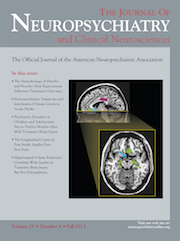To the Editor: We report the case of an 82-year-old woman who presented to the hospital with the acute onset of “FAST” (face, arms, speech) symptoms, including left-sided facial weakness, left-sided hemiparesis, and dysarthria. On examination, the patient was also found to have left homonymous hemianopia and left-sided hemi-neglect, with an NIHSS score of 17/32 and a GCS of 13/15. Head CT scan confirmed the diagnosis of ischemic infarct involving the right middle cerebral artery and resulting in a posterior parietal lesion. The patient underwent alteplase thrombolysis without success, despite some initial signs of functional recovery in the 3 days after the stroke. About 6 weeks later, the patient started complaining that she believed her left arm was not her own, but instead belonged to her brother, who had been present with her when she had the stroke. She said that her “brother’s arm” did not do what she wanted and that this was causing her significant distress. These symptoms spontaneously resolved within 3 weeks.
Our patient was presenting alien hand syndrome (AHS), a rare neurological disorder characterized by involuntary complex movements of a limb that the patient feels does not belong to them and instead is being controlled by an external force.
1 Three main types of AHS have been described: frontal AHS, associated with lesions of the medial frontal cortex and characterized by reflex grasping and compulsive manipulation of tools; callosal AHS, associated with lesions of the corpus callosum and characterized by inter-manual conflict; and posterior cortical AHS, associated with parietal, occipital, and thalamic lesions and corticobasal degeneration, and characterized by sensory ataxia and feelings of estrangement of the upper limb.
1We found very few case reports of AHS after an isolated parietal lesion, usually affecting the left hemisphere.
2–4 Two theories have been proposed regarding the pathophysiology of AHS in extracallosal lesions of the posterior parietal lobe. The first theory suggests that alien hand syndrome may be experienced by a subset of patients with posterior lesions associated with sensory neglect, loss of sensory feedback, and arm ataxia.
1 According to this theory, both the extent of sensory ataxia and premorbid personality may be relevant factors in determining which patients with sensory ataxia will go on to develop AHS. The second theory suggests that the neural circuitry mediating voluntary movements and bimanual coordination forms an extensive network comprising prefrontal areas, supplementary motor areas, and the parietal cortex and their connections with the basal ganglia, cerebellum, thalamus, and cerebral commissures.
5 Therefore, a lesion affecting any component of this widespread network (including the parietal cortex) may result in disinhibition of automatic motor patterns, which form an intrinsic part of all kinds of behavior, including voluntary actions.
There is still considerable uncertainty about the pathophysiology of AHS, particularly for the more recently described posterior subtype. This is in part due to the rarity of the presentation and the often-transient nature of the symptoms. Single case reports can provide valuable insights into the possible pathophysiology of this intriguing phenomenon.

